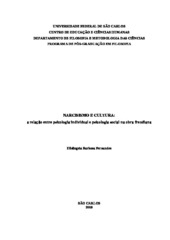Mostrar el registro sencillo del ítem
Narcisismo e cultura: a relação entre psicologia individual e psicologia social na obra freudiana
| dc.contributor.author | Fernandes, Elisângela Barboza | |
| dc.date.accessioned | 2016-06-02T20:13:06Z | |
| dc.date.available | 2008-02-21 | |
| dc.date.available | 2016-06-02T20:13:06Z | |
| dc.date.issued | 2007-08-09 | |
| dc.identifier.citation | FERNANDES, Elisângela Barboza. Narcisismo e Cultura : a relação entre psicologia individual e psicologia social na obra freudiana. 2007. 141 f. Dissertação (Mestrado em Ciências Humanas) - Universidade Federal de São Carlos, São Carlos, 2007. | por |
| dc.identifier.uri | https://repositorio.ufscar.br/handle/ufscar/4827 | |
| dc.description.abstract | This work aims to show how the relationship between social psychology and individual psychology is thought about in Freudian theory. It broaches the issue separating nature and culture, which is dealt with in Freudian discourse as fundamental to the makeup of the subject. Along these lines, we highlight two psychoanalytic concepts that surround the problem: narcissism and identification. The theory of narcissism in its intersubjective dimension provides the basis of examining the opposition between these psychologies and a metaphysiological foundation of social bonding, and therefore, of the very makeup of culture in the Freudian perspective. Beginning with the preliminary analysis of Freud s entry into the discussion of phylogenesis, we go through a discussion of the theory of narcissism through which the death instinct takes the stage. We then discuss this concept in its essential dimension - aggressiveness considering the context of reformulations in the psychic apparatus. Finally, we discuss the conception of the psychoanalytic subject as a potential enemy of civilization , of culture as produced by unconscious and irreconcilable conflicts; and the social and individual psychologies as mutually constituting each other | eng |
| dc.description.sponsorship | Financiadora de Estudos e Projetos | |
| dc.format | application/pdf | por |
| dc.language | por | por |
| dc.publisher | Universidade Federal de São Carlos | por |
| dc.rights | Acesso Aberto | por |
| dc.subject | Filosofia | por |
| dc.subject | Psicanálise | por |
| dc.subject | Metapsicologia | por |
| dc.subject | Narcisismo | por |
| dc.subject | Identificação | por |
| dc.subject | Cultura | por |
| dc.subject | Psychoanalysis | eng |
| dc.subject | Metapsychology | eng |
| dc.subject | Narcissism | eng |
| dc.subject | Identification | eng |
| dc.subject | Culture | eng |
| dc.title | Narcisismo e cultura: a relação entre psicologia individual e psicologia social na obra freudiana | por |
| dc.type | Dissertação | por |
| dc.contributor.advisor1 | Simanke, Richard Theisen | |
| dc.contributor.advisor1Lattes | http://lattes.cnpq.br/5431145327759147 | por |
| dc.description.resumo | Este trabalho tem como propósito mostrar como a relação entre psicologia social e psicologia individual é pensada na teoria freudiana. Insere-se na elaboração da problemática entre a natureza e a cultura, tratada no discurso freudiano como fundamental para a constituição do sujeito. Para tanto, destacamos dois conceitos psicanalíticos que circunscrevem o problema: narcisismo e identificação. A teoria do narcisismo em sua dimensão intersubjetiva fornece a base de questionamento de uma oposição entre essas psicologias e o fundamento metapsicológico do vínculo social e, portanto, da própria constituição da cultura, na perspectiva freudiana. Partindo da análise preliminar da entrada de Freud na discussão da filogênese, passamos por uma discussão da teoria do narcisismo pela qual entra em cena a pulsão de morte. Discutimos, então, esse conceito em sua dimensão essencial a agressividade , considerando o contexto de reformulações no aparelho psíquico. Por último, discutimos a concepção do sujeito psicanalítico como "inimigo em potencial da civilização , a cultura como produzida por conflitos inconscientes e inconciliáveis e as psicologias individual e social como sendo mutuamente constituídas | por |
| dc.publisher.country | BR | por |
| dc.publisher.initials | UFSCar | por |
| dc.publisher.program | Programa de Pós-Graduação em Filosofia - PPGFil | por |
| dc.subject.cnpq | CIENCIAS HUMANAS::FILOSOFIA | por |
| dc.contributor.authorlattes | http://lattes.cnpq.br/3767077086992061 | por |
